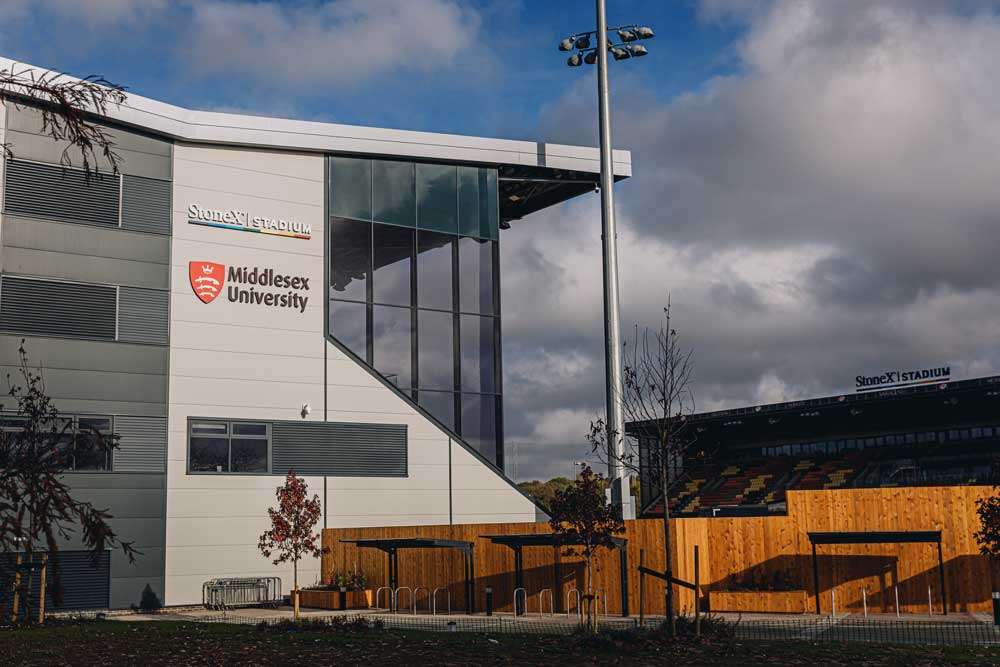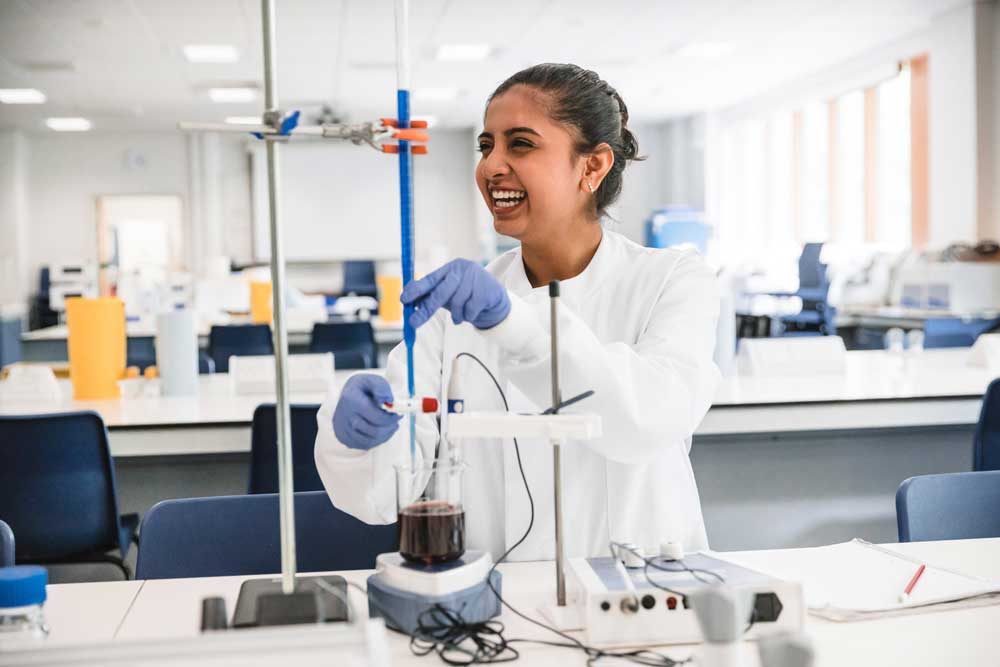My Account Details
How Middlesex University is ensuring future scientists feel represented
A look at how the melting pot of Middlesex University is improving diversity for all

Dr. Sandra Appiah, a Senior Lecturer in biochemistry, was in her London home the day the video of George Floyd’s arrest went viral. Stories of racial injustice weren’t new to her, but this one hit her differently. She felt something in her shift. Dr. Appiah thought of her students in the Department of Natural Sciences at Middlesex University, who came from all around the world. She considered how valuable it was to feel represented in the classroom and what she could do as a Black female biochemist to help create a more diverse, equitable learning environment.
As it turned out, those questions were very much on the minds of others at Middlesex. With 40,000 students from 167 countries—and 70% of whom are Black or Brown—the university is a veritable melting pot. Diversity is part of the school’s fabric, but after the Black Lives Matter movement, equality, diversity and inclusion (EDI) efforts gained new momentum, especially at the main campus in Northwest London.
Workstreams were established, project groups formed, and a chorus of different voices weighed in. From this evolved one of the university’s community principles: to strive to create a fairer world and embed EDI in everything.
Talk turned to meaningful action with intentionality underpinning everything, as articulated by Anna Kyprianou, the Pro Vice-Chancellor for EDI at Middlesex. Dr. Deeba Gallacher, the head of the Centre for Academic Practice Enhancement, and members of the Student Union co-led work on EDI, including the development of an inclusive curriculum.
It was around this time that Dr. Appiah jumped into the mix. She attended university-wide EDI meetings that weren’t just eye opening; they also helped give her efforts some direction. “I heard that Black and Brown people are achieving less in and outside of the university,” she says. “To my shame, I didn’t know the extent of the problem. But as a scientist, I thought, OK, where are the data and what are some solutions to the problem? I was asking a lot of questions, and I also wanted to hear the students’ voices. It was a bit bold because I’ve never done anything like that before, but I decided to start.”

Representation at every step
Dr. Appiah’s first order of business was to get her hands on her own set of data. She focused on metrics about the Natural Sciences department and the larger scientific community. For the next eight months, she and a team of colleagues and students gathered industry statistics, student data and insights from a makeshift focus group.
Their fact-finding mission proved fruitful. The data indicated that attainment gaps varied across the different academic departments, with some more concerning than others. There was clearly a need to create a more diverse learning environment.
The team zeroed in on a few areas, starting with the coursework. Dr. Gallacher’s team had already started infusing EDI into the university’s curriculum. Dr Appiah took it a step further by contacting publishers to take a second look at the reading lists. “If we want students to see themselves, how can we diversify the authors?” she says.
She partnered with McGraw Hill to identify top-notch but overlooked Black and Brown writers from across the sector to form a talent pool of sorts, which instructors could draw from when creating their reading lists.
The spirit of inclusivity is embedded in other areas of the department. For example, an Inclusivity Framework, recently developed by the university, encourages instructors to share case studies and articles that encourage larger discussions about EDI.
There’s also a focus on being more mindful of diversity when bringing on new teaching assistants or deciding which students to nominate for awards and prizes. “We have outstanding students from all ethnicities, and if we’re not aware, we may end up consistently nominating certain groups of people, whether through conscious or unconscious bias,” Dr. Appiah explains. “So we’ll say, ‘These students all have similar grades or similar engagement. How do we make sure that they get representation?’ And that has to be discussed as a team rather than one person making the decision.”
Equally top of mind is ensuring future scientists feel represented. For example, during a recent workshop on employability, hosted by McGraw Hill and the African Commercial Science Network, biochemistry students were encouraged to consider careers in publishing and commercial science. Black and Brown people are underrepresented in both fields. And Dr. Appiah will continue her work on inclusivity in her new role as Learning & Quality Lead (Student Experience) for the Faculty of Science and Technology.
Even the way incoming students are greeted has changed, so that different ethnicities, nationalities and genders are represented at welcoming sessions. (Having a diverse staff makes that job easier, Dr. Appiah points out.) “Whether we speak about EDI or not, students will feel it,” she says.
Inspiring the future
These changes aren’t going unnoticed. “I get emails from students saying how comfortable they feel and how inspired they are,” Dr. Appiah says.
Consider one of them, Anastasia Calin. A former Student Union Vice President for the Faculty of Science and Technology and a medical biochemistry student from Romania, she appreciates the supportive, diverse culture at Middlesex, especially in the Natural Sciences department. Hearing the different accents of the instructors and other students helps her feel more comfortable speaking up in class, and she doesn’t worry about mispronouncing something.
Anastasia is also reaping the rewards of a more diverse reading list. One particularly memorable book was written by Dr. Candace Pert, an American molecular biologist who helped discover endorphins in the late 1970s and was later denied the Nobel Prize.
The book had been published decades before—a lifetime ago, scientifically speaking. And yet Anastasia couldn’t put the book down. Although Dr. Pert’s research was now outdated, the story of her professional journey and how she handled discrimination and biases felt current. Anastasia was riveted. “It showed you that being a woman in this field might be harsh or tough, but you can do it. You just need to be a bit more empowered,” she says. “I would say it was really life changing.”